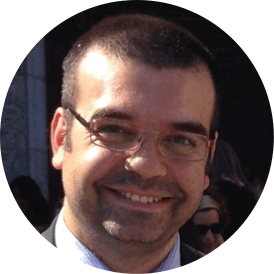Start renewing Universities with… Coffee
- Michael Panao
- 6 de dez. de 2016
- 3 min de leitura

Let me go straight to the point: we should promote having coffee together. For example, create a bar commonly used by people from different fields of knowledge.
In the university research centres I’ve worked, coffee time was always the best place to meet with people in a relaxed environment and spontaneously speak about life and what we are doing. Today, having coffee is a cultural moment that may work to spark transdisciplinarity.
The problem is that Departments have their own coffee shop for logistic reasons, and some research centres, if they’re not already built with a transdisciplinary environment, probably have their own coffee machine, or none. The result is people working alone all the time, without moments to stretch your legs, walk and get together for a coffee.
Obviously, coffee is just a pretext because the essential part is being together to create freely a stimulating environment with the potential for thinking about things with, through and eventually go beyond our disciplines.
First Step
Create opportunities for getting together.
When we meet other colleagues, which may have different fields of expertise, there must be a topic triggering the possibility of sharing our different points of view. A lot of universities use Seminaries where a certain expert is invited to speak about a topic of his or her interest. These Seminaries are open and everyone can attend, professors, students, and even the cleaning staff, who cares!
I remember when I taught Algebra for one semester after finishing my PhD. We had this kind of seminars. I, a Mechanical Engineer, even made one on Science and Religion! Therefore, even if you're not graduated in a field, and develop some work in other fields beyond your usual topic, why not share what you've learned? In my case, I took part in an European Project dedicated to Long-life learning named Eco-Navigation. The project team asked me to develop the Fundamentals of its Ethics, and since I recognize the importance the human spiritual dimension has in everything we do, the dialogue between science and faith became a research topic for me. I shared that in the Seminar and the reception was great.
Usually, in these seminars, the method consists in assisting a presentation by someone, followed by an open discussion period. There are no rules with the purpose of orienting the discussion in a fruitful way. This is why I assisted the birth and death of several Seminar Initiatives. People lose their interest at a certain point and no longer attend, or have to go because their senior supervisor told them to, but their mins is somewhere else. I understand that.
I think what lacked was an approach that induced in everyone the experience of the power behind the unity of knowledge. I wonder if people knew they were invited to experience a transdisciplinary approach, would they react differently? I think this also demanded from the presenters a different approach.
In transdisciplinarity, we should lose what we know, emptying ourselves from our "deceiving sense of knowledge" and be open to listen and interiorize what the other is sharing. It is important for the presenter to explore his topic openly, without fearing if people will judge him for what he's saying. Judgement should be banned from such seminars. This would also imply a different way of discussing where we listen carefully to what the other says, emptying of our thoughts to absorb the other's thinking like a sponge. Afterwards, true listening means making the other's thoughts mine. And when I pronounce something about them in the dialogue (not discussion), it's like I'm self-criticizing, not the other, because his thoughts were given, they're mine, right?
Second Step to Induce the First
Promote Seminars with the most diverse topics stimulating the experience of a transdisciplinary approach.
Time to think about being creative.







Comentários